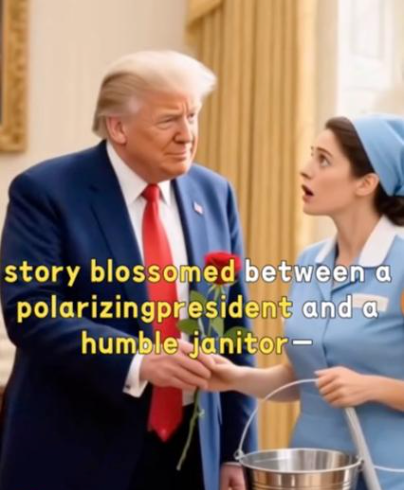Trump Fell for the White House Janitor: 72 Hours to Go Viral, 72 Hours to Get Debunked
Drama in the World of Vertical Drama, is This the New Way to Hype a Show?

✱
Drama in the World of Vertical Drama, is This the New Way to Hype a Show?
breaking news
Join Real Reel
Something curious has been circulating during the past two days.
Friends who know that I spend my days developing vertical dramas all messaged me at once:
Have you seen that Trump mini-series story?
Their excitement pulled me into a deep dive, and what I uncovered is too revealing not to share.
At 12 : 15 a.m. on July 26, Malaysia time, a seemingly ordinary clip appeared on YouTube.
The uploader was Astro, the Malaysian broadcaster whose official channel boasts about seven hundred twenty-eight thousand subscribers. The video lasts only two minutes and ten seconds, yet it declares with absolute certainty that a Mandarin-language short drama titled
Trump Fell in Love with the White House Janitor ⇲
is “taking America by storm,” earning one hundred fifty million U.S. dollars in three months with a pay-to-watch rate of fifty percent, five times the conversion usually seen at home in China.

Overnight the rumor raced across Chinese social media. Starting July 27, Weibo, NGA, and a host of forums copied and reposted the claim. By the afternoon of July 29, the hashtag #特朗普爱上白宫保洁短剧火了 (Trump Fell in Love with the White House Janitor) reached the 11th spot on Weibo’s trending board; one single upload had been shared more than five hundred times and played over 420K times. Baidu’s search index for the title leapt from one thousand two hundred to almost twenty-six thousand within three days. Google’s page count for the phrase jumped from barely a dozen links to roughly 410K. In 72 hours, a story that sounds like pure satire traced a textbook viral curve.
Traditional media widened the blast radius. Within 48 hours, 30+ Chinese news sites and 5 video channels had carried the story. A dozen major portals and finance outlets joined in, and five even placed “$150M U.S. dollars” in their headlines. Articles trumpeted variations such as “Chinese Mini-Series Conquers America” and “$150M U.S. dollars in Three Months,” together painting an exhilarating picture of Chinese dramas vacuuming up North-American money.

The capital market joined the party. At the opening bell on July 30, mainland shares tied to short-form video and interactive entertainment jumped sharply.
Ciwen Media locked at its daily limit almost instantly, and COL Digital Publishing Group (ReelShort) gained more than 6%. Social investors cheered, convinced that miniature dramas really can print money.
The thrill did not last. The flashier the numbers looked, the faster they unraveled under scrutiny.
Global revenue for the entire short-form sector in the first quarter of 2025 had only just passed 700M dollars. For one single title to pocket 20% of that pool seemed impossible.
Meanwhile the series was nowhere to be found in databases such as IMDb or ReelShort, and Google’s knowledge panels remained blank.
Doubts kept snowballing.
Late on July 29, Chen Ruiqing, chief executive of Dianzhong Technology, wrote publicly, “One hundred percent fake news, new personal record for nonsense.” He traced the rumor to its source and rebuked outlets that ran it. Within twelve hours, Red Star News and Phoenix Finance released investigations confirming that both the drama and the dazzling revenue were fabricated. Weibo traffic collapsed, and Baidu as well as Google metrics began to slide on the afternoon of July 30.
Why did a made-up success story manage to stir public opinion and nudge stock prices in only three days? The recipe is straightforward.
First, the premise itself is engineered for clicks: a former U.S. president falls for a janitor inside the White House, an instant mix of conflict and taboo.
Second, it borrows legitimacy from genuine industry momentum. China’s mini-series sector surpassed the equivalent of $6.9 billion U.S. dollars in 2024, reaching roughly 660M domestic viewers. Services like ReelShort have reported monthly income in the tens of millions, so “one hundred fifty million” does not sound unthinkable at first blush.
Third, artificial-intelligence tools make fabrication easy: English voice-overs, stitched-together photos, and green-screen captions can package fiction as international news within minutes.
Finally, in the rush for clicks, several portals posted the headline without a single round of fact-checking.
This episode leaves a clear warning.
In a segment expanding at breakneck speed, verifying data should come before chasing headlines. For creators and platforms, the surest path to global audiences is still quality storytelling backed by solid business logic, not a fantasy press release. For reporters and investors, a quick question: ‘where do these numbers come from?’ beats the thrill of being first to share.
72 hours were all it took for a series that never existed to rocket from obscurity to fame and back to nothing. Those same seventy-two hours handed the mini-drama business, the media, and the market a vivid lesson in media literacy. Next time a miracle series appears out of nowhere, let’s pause before hitting share, open a database or two, and decide whether the claim truly earns our attention or our cash.
Hey, @Mr. Trump, did you know your name just inspired a quick profit run in China’s stock market?
✱







